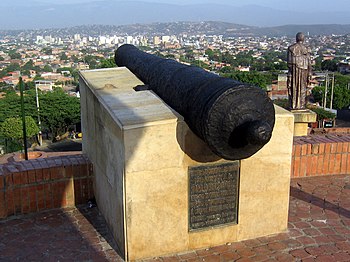Battle of Cúcuta
| Battle of Cúcuta | |||||||
|---|---|---|---|---|---|---|---|
| Part of Spanish American wars of independence | |||||||
 |
|||||||
|
|||||||
| Belligerents | |||||||
| New Granada, Pro-independence forces | Spanish Monarchy, Royalist | ||||||
| Commanders and leaders | |||||||
|
Simón Bolívar Francisco de Paula Santander |
Ramón Correa | ||||||
| Strength | |||||||
| 400 | 800 | ||||||
| Casualties and losses | |||||||
| 2 dead and 14 wounded | 20 dead and 40 wounded | ||||||
The Battle of Cúcuta was a military conflict in the Spanish American wars of independence fought on February 28, 1813 between the pro-independence forces led by Simón Bolívar and Spanish royalist troops under General Ramón Correa at the town of Cúcuta, in present-day Colombia, close to the border with Venezuela. Bolivar was victorious. The battle gained him much support and immediately preceded his march into Venezuela, later dubbed the Admirable Campaign.
The battle began at 9:00 a.m. on 28 February 1813, and finished in the early afternoon involving four hundred men under the command of Simón Bolívar and eight hundred under Spanish General Ramón Correa fought. There were two fatalities and fourteen injuries among Bolívar's troops, and twenty fatalities and forty injured among Correa's troops.
Simón Bolívar launched an offensive against the Spanish forces along the eastern banks of the Tachira River. Bolívar's campaign ended in victory, enabling him to drive Royalist forces from the valleys of Cúcuta.
On 28 February 1813, the Sunday of Carnival, General Correa went to church; meanwhile Bolívar's forces had positioned themselves in the western hills that overlook the town of Cúcuta. General Correa learned of this movement and set out to drive Bolívar's troops from their positions. A force of about 100 royalist infantry tried to overcome the right flank of Bolívar's army, but a fast change of position foiled the attempt. There was heavy fighting throughout the morning. The battle lasted four hours before it was decided. In the afternoon, Bolívar ordered a bayonet charge, which drove General Correa's men from the field.
The decimated troops fled to San Antonio del Táchira and to La Grita.
Simon Bolívar entered Cúcuta with his soldiers and declared victory from General Correa's captured headquarters.
Supporters of independence rejoiced and cooperated openly with Bolívar. Mercedes Abrego de Reyes, in order to show her support and admiration for Bolívar, embroidered a coat for him, which he wore during the Admirable Campaign that liberated Venezuela from the Spanish; she was later arrested by the Spanish, accused of conspiracy and executed on 13 October 1813.
...
Wikipedia
